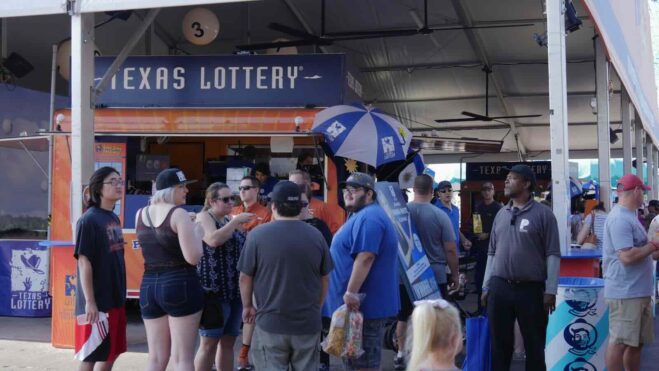US Lottery Industry Quietly Undergoing Revolutionary Changes
Lotto.com does “95 percent” of its ad spending on sites such as Facebook and Google
4 min

The three-day Racing and Gaming Conference at Saratoga this week naturally featured plenty of discussion of horse racing, given the event’s location in the shadow of the iconic, 161-year-old Saratoga Race Course — the oldest major sporting venue in the U.S. — in Saratoga Springs, New York.
Sports betting, casinos, and online casino gaming also were in play at the conference. But so, too, was another venerable American gambling product: the lottery. All but five states (Alabama, Alaska, Hawaii, Nevada, and Utah) offer a state lottery, and both Powerball and Mega Millions — with grand prizes sometimes totaling figures into the three comma range — draw national media attention as the prizes grow.
But there are other, less publicized, innovations driving the lottery industry these days as well.
At the panel “The Modernization of The Lottery: A Brave New World” on Tuesday, hosted by prominent gaming lobbyist Bill Pascrell III, some of the discussion touched on lottery courier services, first approved in New Jersey in 2017 and now available in numerous states.
Growing the pie, online
Tom Metzger, the CEO of Lotto.com — which has gained approval in 10 states, some of them hardly pioneers in gambling expansion such as Texas, Arkansas, and Nebraska — said that his technical people found a way to digitally replicate the familiar “scratch-off ticket experience” without literally using a coin on a piece of paper.
Instead, the player purchases a ticket on their smartphone, then receives a digital copy of their paper ticket. From there, they can virtually “scratch off” one number at a time on their touch screens as they dream of a (well, not quite likely) big jackpot.
“The digital area looks just like you would see at retail,” said Metzger, who hinted at a major media campaign to increase consumer awareness of the option in the coming months.
The ticket buyer can then elect to see all the numbers at once on their electronic device, or replicate the traditional lottery experience of “one square at a time.”
Much like the decade-old tug-of-war regarding traditional casinos and the online version of such games, the battle of lottery vs. iLottery also is still being fought in many jurisdictions.
In each case, data seems to show that rather than cannibalization, the digital versions are luring in new customers who are not interested in visiting a casino nor waiting on a convenience store line to buy a lottery ticket.
Metzger said that whenever a national lottery prize offering reaches into the hundreds of millions of dollars, many younger consumers automatically look to their electronic devices to find out how to buy a ticket. He said that his company doesn’t bother putting up a highway billboard, for example, seeking to lure traditional lottery players away from local retailers and over to his digital product. Instead, he said Lotto.com does “95 percent” of its ad spending on sites such as Facebook and Google because that’s where his prospective players are.
No sticker shock on big scratch-offs
Both Metzger and James Carey, the executive director of the New Jersey Lottery, said that consumers increasingly are buying up more and more expensive instant scratch-offs in either form. Carey said that his state’s best seller of late is $30 scratch-off tickets.
“It’s amazing to me that there are $50 scratch-offs in some states,” Carey said.
But the saying “everything is bigger in Texas” also applies to scratch-offs, where Metzger said that $100 fees for one ticket there since 2022 have proven to be quite appealing to the public.
Remarkably, Lotto.com in Texas is able to charge a $10 convenience fee — so, a 10% surcharge on those tickets — with little to no resistance from younger consumers for whom convenience is paramount. Thus they pay an extra $10 rather than walk or drive as little as a half-mile to buy the same product at a convenience store with no surcharge.
“That’s why I say these are not the same players as retail lottery ticket buyers,” said Metzger, who said a vast majority of his customers are age 35 and younger.
A Lotto.com customer, Metzger added, tends to wait for a national jackpot to grow large before “getting into the game,” compared to traditional lottery players who in some cases buy several tickets a week and have done so for decades.
“When a jackpot reaches $500 million, our sales quadruple,” Metzger said.
While these newer lottery players are willing to pay extra for convenience, they understandably expect the same in return.
Carey said that “it embarrasses me to say this, but even just earlier this year it had been taking us six to eight weeks to pay a winner if they had a mail-in claim” — the latter being a requirement if the prize is for more than $600. “We get 200 to 400 claims a week, and now we are down to two to three weeks to pay. We are a customer service organization, so we have to give great customer service.”
Pascrell noted that bureaucratic resistance to lottery courier sales typically comes from older people in positions of authority, who, like traditional casino operators from a decade ago, are liable to be convinced that adding an electronic version of traditional gambling would greatly harm the traditional product rather than adding incremental value to total revenues.
But Metzger pointed out that state lotteries “are woefully underfunded from a marketing standpoint in most states, where they might only spend 1 percent of revenue on sales marketing.”
Courier operators like his company, Metzger said, spend far more in advertising — effectively doing the bidding to an extent of the state lotteries. That new customer to lottery play, Metzger said, becomes familiar enough with the games that if he does happen to enter a convenience store, now for the first time he may buy a paper ticket as well.
Lottery sales growth in all forms is a vital issue for states. Carey said that the state lottery stands as the fifth-largest source of income for the state treasury, with all of the largest ones being a direct form of taxation.
So with younger consumers increasingly focused on their electronic devices, it’s likely that state lottery directors will have to move to approval either of a state-sponsored iLottery or a partnership with couriers such as Lotto.com and Jackpocket.com, the latter having been bought by sports betting and daily fantasy sports giant DraftKings for $750 million earlier in 2024.






